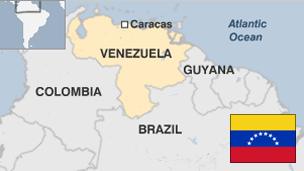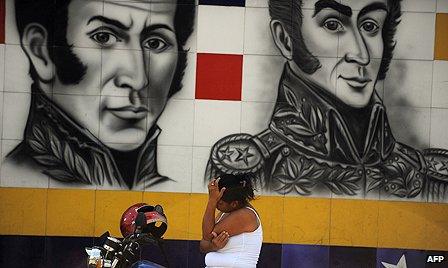Venezuela profile - Overview
- Published

Venezuela has some of the world's largest proven oil deposits as well as huge quantities of coal, iron ore, bauxite and gold.
Yet most Venezuelans live in poverty, many of them in shanty towns, some of which sprawl over the hillsides around the capital, Caracas.
Venezuela's economic fortunes are tied to world oil prices. A 1970s boom largely benefited the middle classes, but a subsequent price collapse condemned many of them to poverty while eroding the living standards of the already impoverished.

National hero Simon Bolivar led several Latin American countries to independence from Spain
Unemployment is high and, according to official figures, around 60% of households are poor.
In 1998 Venezuelans broke with the party system to elect populist left-winger Hugo Chavez, a former army officer who proclaimed a "Bolivarian revolution", named after South America's independence hero.
Mr Chavez died in 2013, but was succeeded by his vice-president, Nicolas Maduro, who pledged to continue his policies.
Socialist reform, political unrest and deep divisions characterised President Chavez's term in office. His supporters - known as "chavistas" - and his detractors both staged street protests.
Supporters said his economic reforms - including the nationalisation of much of the economy, especially the oil sector - and his expansion of social programmes helped the poor benefit from the country's oil export revenues. Critics say Chavista policies have harmed economic performance.
Government controls setting fixed rates for buying and selling US dollars, introduced in 2003, have created a booming black currency market, causing shortages and fuelling inflation, which rose to over 50% a year in 2014.
The authorities blame the rampant inflation on businesses undermining the system, and have responded with controls on prices and company profits. Critics believe this will only exacerbate distortions in the economy.
Regional influence
Venezuela under Mr Chavez sought to strengthen its regional influence through diplomatic and economic overtures towards other South American and Caribbean nations.
This has been seen, in part, as an effort to counter Washington's influence in the region, and has been a contributory factor to strained relations with US allies such as Colombia.
Mr Chavez also aligned himself with Russia and Iran, and frequently expressed support for anti-Western leaders in the Middle East and elsewhere.
A country of striking natural beauty, which ranges from the snow-capped Andean peaks in the west, through the Amazonian jungles in the south, to the beaches of the north, Venezuela is among the most highly urbanised countries in Latin America.
_afp.jpg)
The world's tallest waterfall: Angel Falls in Canaima National Park, southern Venezuela